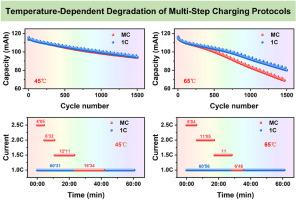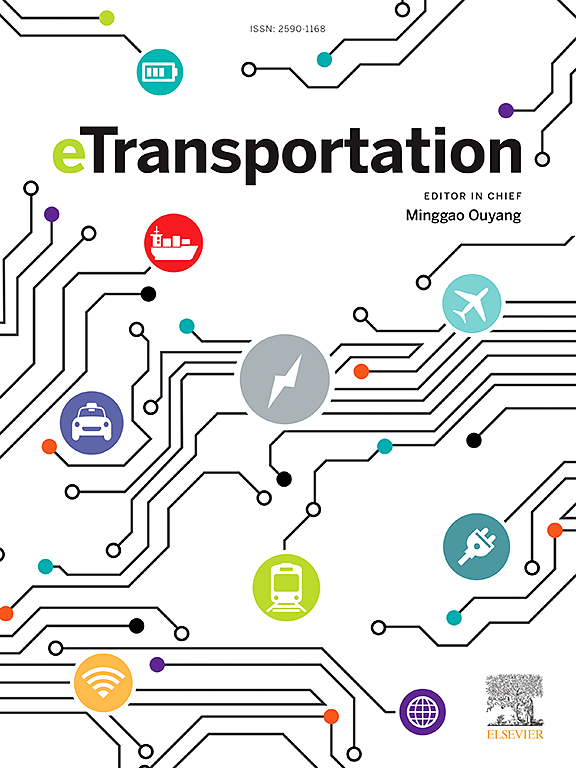Temperature-dependent degradation mechanisms of LiFePO4/graphite batteries under multi-step fast charging protocols
IF 17
1区 工程技术
Q1 ENERGY & FUELS
引用次数: 0
Abstract
The development of fast-charging strategies is crucial for advancing lithium-ion battery (LIB) technologies, particularly in applications requiring rapid energy replenishment without compromising long-term durability. This study systematically investigates the temperature-dependent degradation behavior of LiFePO4/graphite (LFP/Gr) pouch cells under a multi-step fast-charging protocol. A combination of multi-scale non-destructive evaluations and post-mortem structural analyses was employed to elucidate the underlying mechanisms. Results demonstrate that at moderate temperatures (45 °C), the multi-step charging strategy effectively shortens charging time by approximately one-third compared to conventional methods while maintaining stable cycling performance. However, under elevated temperatures (65 °C), despite the improvement in charging speed, significant acceleration of capacity fading and structural deterioration is observed. Mechanistic insights reveal that active lithium inventory loss, rather than active material degradation, predominantly governs the aging process, with thermal effects exacerbating side reactions, interfacial instability, and lattice disorder. Furthermore, the interplay between lithium-ion transport, polarization effects, and mechanical stress under varying thermal conditions critically impacts electrode integrity. These findings highlight that while multi-step fast charging provides considerable efficiency advantages under controlled conditions, it substantially amplifies degradation at higher temperatures, necessitating temperature-sensitive optimization to balance charging speed with long-term battery stability.

多步快速充电条件下LiFePO4/石墨电池的温度退化机制
快速充电策略的发展对于推进锂离子电池(LIB)技术的发展至关重要,特别是在需要快速补充能量而不影响长期耐用性的应用中。本研究系统地研究了LiFePO4/石墨(LFP/Gr)袋状电池在多步快速充电条件下的温度依赖性降解行为。采用多尺度非破坏性评价和死后结构分析相结合的方法来阐明潜在的机制。结果表明,在中等温度(45°C)下,与传统充电方法相比,多步充电策略有效地缩短了充电时间约三分之一,同时保持了稳定的循环性能。然而,在高温(65°C)下,尽管充电速度有所提高,但容量衰退和结构恶化的速度明显加快。机理分析表明,控制老化过程的主要因素是活性锂库存损失,而不是活性材料降解,热效应加剧了副反应、界面不稳定和晶格无序。此外,在不同的热条件下,锂离子输运、极化效应和机械应力之间的相互作用严重影响电极的完整性。这些发现强调,虽然多步快速充电在受控条件下提供了相当大的效率优势,但它在较高温度下会大大加剧电池的退化,因此需要对温度敏感的优化来平衡充电速度和电池的长期稳定性。
本文章由计算机程序翻译,如有差异,请以英文原文为准。
求助全文
约1分钟内获得全文
求助全文
来源期刊

Etransportation
Engineering-Automotive Engineering
CiteScore
19.80
自引率
12.60%
发文量
57
审稿时长
39 days
期刊介绍:
eTransportation is a scholarly journal that aims to advance knowledge in the field of electric transportation. It focuses on all modes of transportation that utilize electricity as their primary source of energy, including electric vehicles, trains, ships, and aircraft. The journal covers all stages of research, development, and testing of new technologies, systems, and devices related to electrical transportation.
The journal welcomes the use of simulation and analysis tools at the system, transport, or device level. Its primary emphasis is on the study of the electrical and electronic aspects of transportation systems. However, it also considers research on mechanical parts or subsystems of vehicles if there is a clear interaction with electrical or electronic equipment.
Please note that this journal excludes other aspects such as sociological, political, regulatory, or environmental factors from its scope.
 求助内容:
求助内容: 应助结果提醒方式:
应助结果提醒方式:


